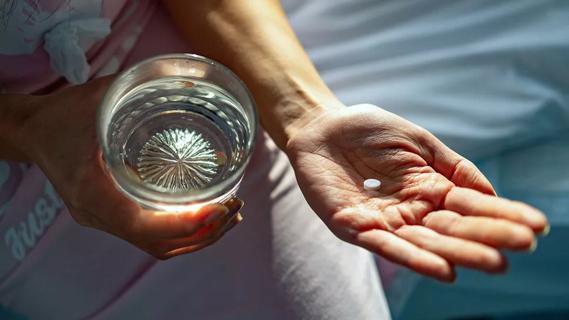Blood pressure naturally dips when we sleep — and that dipping is crucial for a healthy heart

We’ve all heard it before: Adults need to get between seven and nine hours of sleep a night to be healthy. But like a lot of health advice, that’s easier said than done. In fact, over 70 million Americans are sleep deprived.
Advertisement
Cleveland Clinic is a non-profit academic medical center. Advertising on our site helps support our mission. We do not endorse non-Cleveland Clinic products or services. Policy
That’s a big number. But here’s a bigger one: 75 million. That’s how many Americans have high blood pressure, also known as hypertension.
The global number is even more shocking: According to the World Health Organization (WHO), 1.28 billion people between the ages of 30 and 79 are living with high blood pressure — and more than 700 million of them aren’t getting treatment for it.
The more we learn about the role sleep plays in our cardiovascular health, the more obvious it becomes that the high levels of sleep deprivation and hypertension in the U.S. are no accident.
We talked to cardiologist Ashish Sarraju, MD, about how and why sleep quality and quantity impact blood pressure — and what you can do about it.
One of the many things that’s frustrating about sleep is just how limited we are in our understanding of it. We know we need sleep to survive — and that not getting enough can seriously harm our health and well-being. But we don’t know exactly why that is.
But here’s what we do know: Sleep is integral to heart health. In fact, the American Heart Association recently recognized the importance of healthy sleep by adding it to their Life’s Essential 8 checklist for improving and maintaining cardiovascular health.
Advertisement
“There is a body of literature that indicates that poor sleep duration and poor sleep quality is significantly associated with poor blood pressure management,” Dr. Sarraju says. “Whether the relationship is causative or not, I think is less clear.”
In other words, sleep deprivation is one of many risk factors that contribute to hypertension. Some of the other factors include our age, diet, exercise, whether or not we smoke and our family history.
Sleeping allows for a phenomenon called “nocturnal dipping.” Dr. Sarraju describes nocturnal dipping as the idea that our blood pressure drops overnight.
“When we’re sleeping,” he says, “we see about a 10% drop in blood pressure. Researchers think it relates to our internal circadian rhythm.” That makes sense, he adds, because we make more demands on our heart when we’re awake.
If we’re not sleeping well or long enough, that dipping won’t happen. That’s a problem, Dr. Sarraju states, because “nocturnal non-dipping has been associated with increased hypertensive and cardiovascular risk.”
How much a lack of sleep impacts your heart varies from person to person based on a wide range of factors, including the reason you’re not sleeping well. Dr. Sarraju observes this often in his clinic.
“Especially if someone has blood pressure that’s been deemed difficult to control, one of the things we look for is whether they may have a sleep disorder like obstructive sleep apnea,” he says. “In those cases, we encourage our patients to consider a sleep study — to get the diagnosis and be prescribed an appropriate positive airway pressure therapy, like a CPAP machine.”
Dr. Sarraju adds that “There are some circumstances where a sleep disorder like insomnia or apnea makes hypertension worse. In those cases, treating the sleep disorder can directly reduce blood pressure.”
Of course, not every person living with hypertension has a sleep disorder. For many of us, sleeplessness is a side effect of our daily lives — something over which we have limited power. Maybe you have a new baby at home who wakes you up every hour. Maybe you were born with the world’s smallest bladder. Maybe you work the night shift. Or maybe you live with chronic pain and just can’t seem to stop hurting long enough to get the rest you need.
“Getting good sleep is dependent on so many external factors, some of which may not be in the patient’s control,” Dr. Sarraju notes. That’s why he focuses on raising awareness — he understands that telling people to “just get more sleep” is the opposite of helpful.
Advertisement
“I think that would be counterproductive,” he continues. “I think it’s about being empowered, and knowing that — when circumstances allow — moving steadily towards better sleep hygiene may help you manage your cardiovascular health.”
Dr. Sarraju focuses his attention on optimizing sleep hygiene and helping his patients make little changes that may eventually add up to meaningful progress.
Some of the ways you can invest in rest include:
Advertisement
You probably aren’t going to be able to do all of these things — at least, not all at once. But that’s OK. Small steps are still steps, and even a little progress is worth making when it comes to something as important to your heart health as sleep.
Advertisement

Sign up for our Health Essentials emails for expert guidance on nutrition, fitness, sleep, skin care and more.
Learn more about our editorial process.
Advertisement

Foods high in potassium, calcium and vitamins C and E can help lower your blood pressure

Making lifestyle changes can help reduce your blood pressure, but taking cinnamon supplements probably isn’t one of them

Hypertension strains your heart and blood vessels, causing damage that can contribute to heart attacks

Daily stressors can increase BP in the moment, as well as contribute to habits that can feed long-term hypertension

Moderation is best when consuming caffeinated drinks to avoid unhealthy spikes in BP

Medication, exercise and diet changes can all help

While not magic elixirs, some drinks like beet juice and skim milk may help keep numbers down

Don’t believe the rumors about aspirin being a magic way to lower BP

Even small moments of time outdoors can help reduce stress, boost mood and restore a sense of calm

A correct prescription helps your eyes see clearly — but as natural changes occur, you may need stronger or different eyeglasses

Both are medical emergencies, but they are very distinct events with different causes